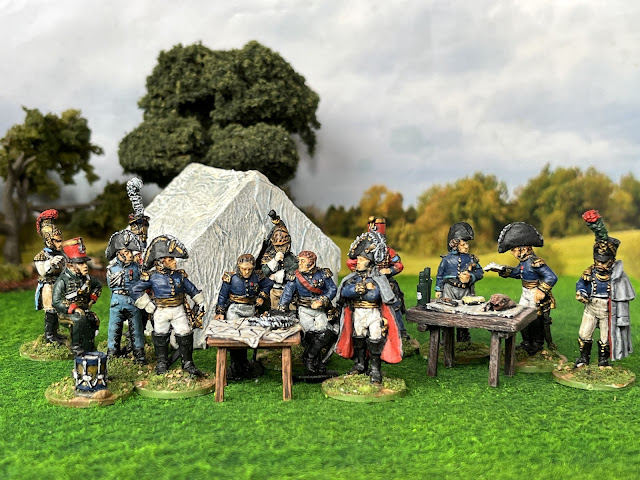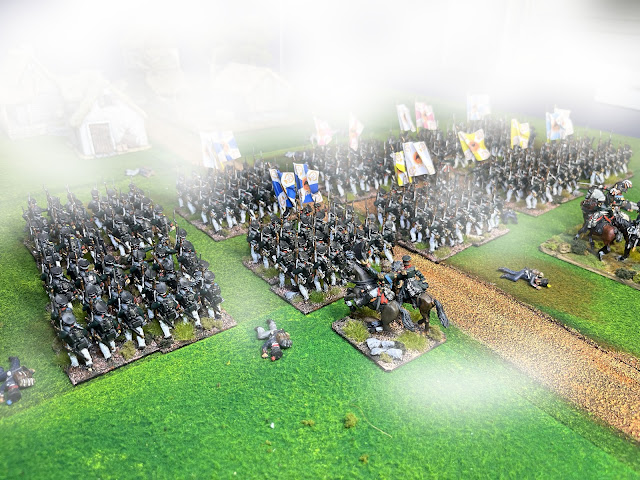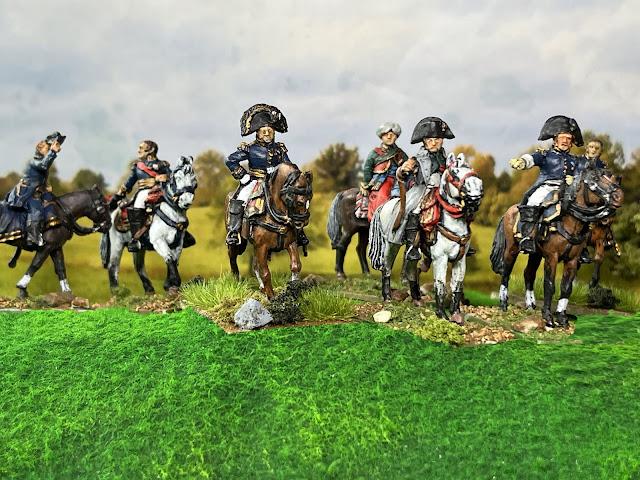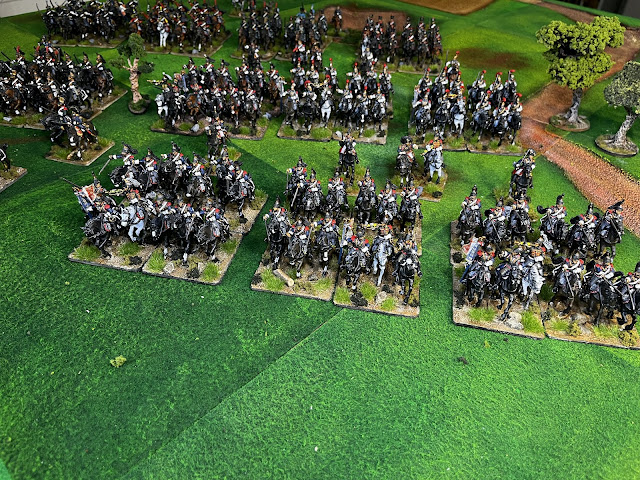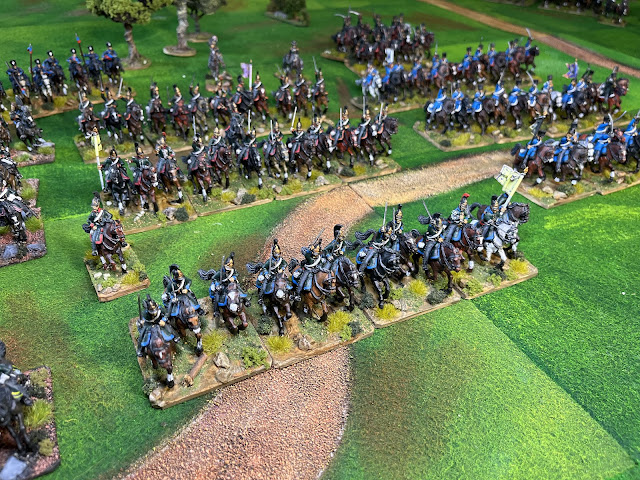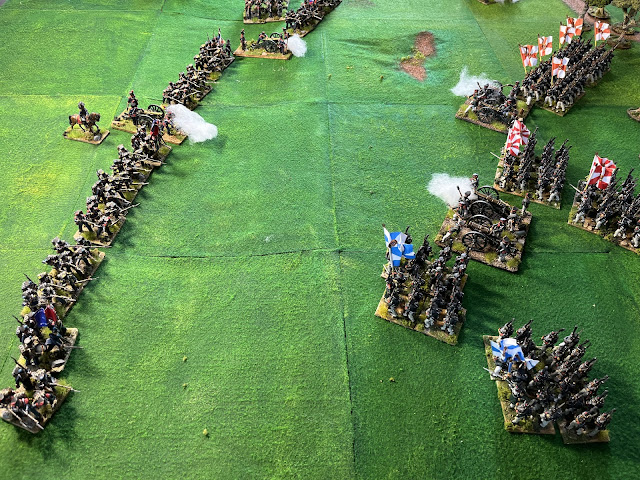Previous Episodes
Episode 1: The Affair at Seusslitz
Episode 2: The Battle of Blasthof Bridge
Episode 3: The Battle of Wurzen
Leipzig - Thursday, 14 October 1813
It had been nineteen days since the Battle of Wurzen where Henri Bonhomme had beaten off the attacks by Russian and Austrian troops. The battle had cost his division some 1,200 casualties along with several hundred of the cavalry forces that has been assigned to him, but the division had rested during that time and many of the lightly wounded had recovered and returned the the ranks. Morale in the division was high after a visit from the Emperor.
Bonhomme had reason to be happy with the result at Wurzen. Macdonald had given him credit for the success and he had been given the honour of dining with the Emperor as a result. What did not please him was that he had still not managed to get his wagon load of loot across the river and away to France. The Gendermerie, in their efforts to curb desertion and control the shirkers, were particularly active in ensuring that no wagons or troops left the operational area. He had tried to use his authority by accompanying the wagon to the bridgehead personally, but the Gendarmes were adamant that nothing was to cross the river without specific instructions from Imperial Headquarters. So he waited for an opportunity.
As the October days passed rumours of the approach of the enemy increased. Something big was brewing.
*******
Following the disaster at Wurzen Hockmeister had been removed from his command at the insistence of the Russians. However, his aristocratic rank demanded that he remain with the army and was assigned to Corps Headquarters, an assignment that he found particularly appealing because there was an excellent supply of food and wine that attracted a large number of pretty women to the mess tables.
His duties were light - the occasional inspection here and there, or an order delivered. There was plenty of time for “extracurricular” activities. This staff placement was a good thing for a man like Albrecht Hockmeister.
******
Boris Knockerov still smarted from the repluse at Wurzen. If that idiot Hockmeister simply done as he was told and held the French in place instead of making that bungling attack he could have taken the French position and cleared the road that would have allowed the Coalition forces to concentrate ten days ago and probably have caught the French before they could form. Now they that were concentrated tightly around Leipzig, a dangerous force ready to strike out. Still at least he had manged to get Hockmeister removed from command and assigned to headquarters where he could no real harm.
Knockerov’s command had suffered heavily at Wurzen, but he had spent the last 19 days wisely re-equipping and consolidating some weakened battalions. When his corps commander fell ill he had been given command of the corps that now comprised of:
- 26th Infantry Division: two brigades each of two musketeers battalions, one brigade of two jäger battalions, 1 position and one horse battery
- 15th Infantry Division: one brigade of three musketeer battalions, one brigade of two musketeer battalions, one brigade of two jäger battalions,
- Corps Artillery Reserve: two position and two horse batteries
- Cavalry Division: one brigade of three dragoon regiments, one brigade of two mounted jäger regiments and four cossack regiments.
The supply services were as poor and corrupt as ever. Some troops had gone without food for days and the French had already stripped the area of supplies. Morale was low.
Knockerov held an advanced position near Guldengossa a few kilometers south east of Leipzig. Plans were in preparation for the next day. He expected to receive his orders at any moment.
*******
The Prussians were moving in support of the Russians. Helmut von Pannewitz's command had been expanded since the action of Blasthof Bridge. His weakened brigade had been expanded to two brigades consisting of 6 line, 2 fusilier, 4 reserve and 4 landwehr battalions plus two field batteries. His command had advanced in parallel with and in support of the Russians, with whom he had a good working relationship. As night fell on the 14th his command was in camp at Trena, about one kilometer behind Knockerov’s Russians. Orders would come soon, but it was expected that he would support the Russians.
*******
To the east of Knockerov stood the Austrians, their extreme left held by Holzinger and his rebuilt division. Holzinger was itiching for a fight. The affairs at Seusslitz, Blasthof and Wurzen had been frustrating largely because the bumbling Hockmeister had interfered. He had carefully rebuilt the shattered battalions and morale was high. Like all Coalition leaders he was eagerly awaiting orders.
*******
Marshal Macdonald's Corps consisted of four divisions: Ledru des Essarts' 31st Division, Gerard's 35th Division, Bonhomme's 36th Division and Marchand's 39th Division. They were all gathered north the village of of Holzhausen, a few kilometres east of Leipzig. The Marshal returned from Imperial headquarters mid-afternoon and called four his senior commanders to his tent. They all knew that a big fight was brewing and were anxious to hear the plans.
General Grundler, Macdonald's prim and proper chief of staff, fussed about setting up a table in front of the headquarters tent on which he spread out the maps. A second table with bread, cold meats, cheese and a couple of bottles of red wine was set to one side.
Macdonald stepped out the tent into the cold air. He walked to the table of food, grabbed a piece of bread, some cheese and poured a cup of wine.
"Damned cold isn't it?", he said as he slapped his hat on the map table.
"Saturday is the day, gentlemen...the day after tomorrow," he continued. He moved Grundler's carefully arranged maps and then spilt some of his wine over them. Bonhomme took amusement at the look of annoyance on Grudler's face. MacDonald continued, "the Emperor had decided that we will attack to the south on Saturday. The main thrust will be made by II, V and VIII Corps between the river and Wachau. We will go in on their left, around of Liebertswolkswitz." He stabbed at the location on the map with his index finger. "We will be supported by Sebastiani's cavalry and are to envelop the enemy right." He indicated the sweep of the flanking envelopment on the map with his hand. "When the action is fully developed, the Guard will deliver the coup de grace through the centre."
"We will assemble tomorrow and then march on Liebertswolkswitz at first light on Saturday. We will sort out the actual dispositions tomorrow, but for now go to your commands...see to your men are ready ..."
That was the dismissal and the men started to move away. MacDonald nodded to Bonhomme to follow him towards the fire. They walked the few paces towards the warmth. The Marshal pulled his coat high up over his shoulders and put out his hands to warm them. "Damn it's cold!" he said.
"This is it Henri. This is the big one. How are your men?"
"Good. As good as can be expected. But there are a lot of conscripts so they need to be handled carefully."
Macdonald nodded knowingly. "I'm going to put you in the front line, Henri. You'll be on the right, Gerard on the left with Marchand between you. I'll put Ledru des Essarts in reserve. He is a good man, for sure, but I'm not quite sure of some of his regiments. I know I can count on you Henri."
"Appreciate the confidence sir, we will do our job."
"I know you will...I hate this cold...would rather fight in the warmth."
Bonhomme smiled, "but we have done well in the cold before - Austerlitz and Eylau..."
"True enough...just wish the ground was firmer. I need wine...join me?"
"No need to twist my arm...," Bonhomme replied as the Marshal's servant poured two cups.
"Now that wagon that has been following you for the last couple of weeks, Henri, is it what I think it is?"
Bonhomme smiled. "The gendarmes won't let me send it west...even with my personal note."
"I'm sending my baggage off tonight. You can add it to my train if you wish. They won't question a Marshal of France..."
"You'd do that for me?"
"Of course Henri, we have served together a long time and you have gotten me out of more than a couple of scrapes...least I can do. Send the wagon over after this...there may not be a chance after today."
Bonhomme thanked him. The Marshal looked off into the distance. "Look after yourself in these next few days Henri. It going to be a tough fight. Best I can make of it there are something like 300,000 converging on us - Russians, Prussians, Austrians and Swedes. The most we can mass is 200,000 and many of them aren't the best troops, as you know. If things don't go well for us this is going to be a hard place to get out of."
"You look after yourself too Jacques."
Macdonald laughed and said, "look to your men, Henri...Bon Chance!" And with that the turned and walked away. Bonhomme finished his wine, mounted and rode back to his camp to tell Baillard to go with the wagon of loot to the Marshal's camp.
*******
Saturday, 16 October
Saturday dawned cold and foggy. Boris Knockerov held the extreme right of the Russian line, directly in front of Wachau. His orders were simple: take the village and keep pushing north.
“Can’t see a damn thing in this fog,” he complained to his ADC. All he could do was plunge forward. The corps stepped off just before 8:00 AM. Soon the buildings loomed out of the fog and the firing started. It was just the pop, pop, pop of skirmisher fire at first, but was soon followed by crashing musketry volleys. Thankfully most of the French were firing high and the Russian battalions only suffered slightly. When they neared the buildings their pace quickened and they closed in on the French defenders who gave up their position easily.
With the jägers in the lead the Russians raced through the village, but when they reached the northern boundary they were met by a storm of French artillery fire. The advance stalled. Knockerov was furious. There was no place to deploy his guns and without artillery support he could not hope to advance. He desperately tried to form a firing line, but every attempt to push beyond the town was broken up and driven back.
The fog was clearing although the smoke from the gunfire still hung low. He could hear them coming before he saw them, the tramping of thousands of feet. When they appeared it was an inspiring sight. Battalion after battalion advancing with precision. He had no guns forward to break up the attack and his front line was inadequately formed. His battalions soon fell back before the French columns.
With some horror Knockerov watched his troops pouring back through Wachau with the French light infantry harassing them as they went. But where passing through village had caused problems for the Russians, it caused the same problem for the French. The columns had to swing wide to pass around it and they bunched up in doing so. As they rounded the sides of the buildings the Russian gunners further back brought them under fire. Now it was the turn of the French to try to form up under fire and they did a better job of it than the Russians and managed to push forward several hundred paces before the Russian gunfire began to bite.
Knockerov managed to bring the 15th Division in to line and began to push back. The French advance fell back, but could not be driven. They had brought guns forward and blasted away at frighteningly close range.
A desperate fire fight developed although it was impossible to see what was happening through the dense clouds of smoke. The fight was stagnating. Knockerov had only cavalry uncommitted and there was no opportunity to engage them here. He knew he just had to hold on until support came up.
Off to his right he could see the white coats of the Austrians advancing against Liebertwolkwitz.
*******
Macdonald had issued his orders early on Friday so that each of his commanders had ample time to make his arrangements. The advance was to begin at daybreak on Saturday. Bonhomme was to hold the right of Macdonald’s line to the right of the large village of Liebertswolkwitz. The 2nd Heavy Cavalry Division would be to his rear, in support. Marchand’s the 39th Infantry Division would be on his left, directly in front of the village.
In line with Macdonald’s orders Bonhomme had his division on the march from Holshausen to Liebertswolkwitz at dawn. The ground was still heavy from several days of rain and a heavy fog shrouded the field. At 8:00 AM, as Bonhomme’s columns neared Liebertswolkwitz, heavy firing broke out to the right near the village of Wachau. The Russians it seemed had collided with Marshal Victor’s II Corps. Unable to observe the fighting in the smoke Bonhomme listened carefully to the developing action. It soon became evident that Victor was being driven back and Bonhomme prepared to face a threat from that direction.
“Steady Henri,” Macdonald said as he rode up. “Lauriston’s and Pontiatowski’s Corps are there to assist him. Our job lies to their left. Hold the course. We have to drive beyond Liebertswolkwitz, and keep that lot tried up until the Guard come up. The cavalry will guard your flank. Just watch Marchand to your left, he may have some trouble in the town.”
Bonhomme nodded in agreement, but for his own safety deployed one battalion of the 33rd Legere in open order to his right, just to protect against any surprises.
********
Holzinger had his battalions formed before dawn and the men waited in the cold foggy morning until they heard the Russians to their left go into action. By 8:00 the fog was beginning to lift and he could see that the Russian line had halted and was fiercely engaged.
Directly in front of him Holzinger saw the village of Liebertswolkwitz. All he could see were a few French skirmishers in the gardens of the village. He waited for the order to advance and hoped it would come soon, before the French could completely occupy the village.
He looked to his right and saw the division there preparing to advance. Surely the order for him to move could not be far away, Looking behind he saw a rider coming. “This must be it,” he thought. As the rider neared he had a familiatity. “Damn it, it's Hockmeister!”
“Good moring General,” Hockmeister said in greeting. “Complements of Field Marshal Klum. You are to advance at once on Liebertswolkwitz. You are to secure the village and anchor the left of our line. If practical you can push beyond the town, but do not lose grip on the place. I am to remain with you and have the authority of the Field Marshal to direct operations where needed.”
Holzinger seethed, but tried not to let it show. He turned sharply away and gave the order to advance. The Grenadiers were on the left, with the Grenz and the jagers to their right and the three battalions of Regiment Freiherr von Zach in support directly behind the Grenadiers. Regiment Hockmeister formed the general reserve some 200 paces behind Von Zach To the right stood the artillery, which was already in action.
Holzinger did not want to try to storm Liebertwolkwitz, rather he wanted to mask it with the Grenz, the jagers and the guns, while the the line infantry and grenadiers looked to sweep around the outside of the village. It was a significant attacking column and it stepped off confidently at a steady pace.
To his surprise the French gave way easily in the village and he ordered the Grenz and Jagers to secure it, and sent two battalions of Regiment Hockmeister to support.
*******
Bonhomme’s advance was slowed by a large patch of boggy ground north of Liebertwolkwitz and Marchand closed up on the place a full 20 minutes ahead of Bonhomme’s first battalions. Marchand immediately clashed with the Austrian infantry who had entered the southern edge of the town as his troops entered from the north. The fighting there erupted fiercely and Bonhomme watched with concern.
As he closed in on Marchand’s right Bonhomme noted the approach of a significant body of Austrian and he prepared to receive the attack. But the Austrians were coming on in big solid blocks and faster than he initially thought.
They didn’t pause to fire, just came on. Zentz’s men opened fire with some effect, but the advance was not stopped. He could see more now and the Austrians were a mere 50 paces from Zentz's line. White uniforms with fur busbys, “Damn it...grenadiers,” he thought. He saw them level their muskets and waited for the collision.
The impetus of the Austrian masses drove back Zentz’s lines. A huge noise accompanied the meeting of the forces. Zentz was giving ground, but his lines were not breaking. Bonhomme warned Saint-Arnaud, whose brigade stood behind Zentz in column of divisions, to be ready.
The Austrian advance was beginning to slow. Some groups halted to fire while others rushed forward to try to grapple. Zentz was still holding, but Bonhomme could see fresh masses behind the grenadiers. They would soon overwehlm Zentz. He gave the order for Saint-Arnaud to go. He saw the columns advance and push their way through Zentz’s now disordered line and plowed into the Austrian grenadiers, who recoiled under the impact of the fresh troops and fell back towards their supports.
Bonhomme rode forward to Saint-Arnaud and yelled “Push them, Christophe, push them hard.” With that he looked to the rest of the division, telling Zentz to reform behind Pouget, and put Pouget on alert. Then he turned to watch Saint-Arnaud’s fight.
*******
Holzinger was forward with the troops. Since the disaster at Wurzen, where the battalion masses had been too tightly bunched so that they could not manoeuvre, he had worked with the regimental and battalion commanders to ensure that they left sufficient a gap between the masses to allow fugitives to pass between. Now, as the grenadiers began to withdraw, that training was paying off. The grenadiers were passing through those broad gaps without disturbing the fresh masses of the Von Zach battalions that stood to the rear.
The French we coming on but were still some 200 paces away. The three battalions of von Zach were well placed and as the Grenadiers cleared them Holinger watched with pleasure as the centre battalion deployed into line as though it was on the parade ground. When the French were about 100 paces distant he saw the line deliver a heavy volley and the French columns halted. The two flank battalions now shook themselves out into line and the French columns did the same. Within minutes a huge firefight erupted across the front. The smoke was so intense that it was impossible to see anything. The fire continued with neither side giving any ground.
Holzinger was pleased with the way things were going. The grenadiers had been pushed back, but were not broken and were reforming to the rear. He was keen to push the issue further and prepared to push one or both of the two reserve battalions of Regiment Hockmeister to tip the fight in his favour, but when he turned back to call them forward he saw them moving off to the right with Hockmeister leading them!
*******
Bonhomme watched Saint-Arnaud’s battalions drive back the Austrian grenadiers, but fresh masses stood behind them. He encouraged Saint-Arnaud to push on and break the Austrian further south. He could see that Marchand was struggling in the village, where the Austrians seemed to be getting the upper hand. Bonhomme had troops to spare to support him, but if Saint-Arnaud could drive the enemy off then he could flank the village which would probably force the Austrians out without a heavy cost in casualties.
As he watched Saint-Arnaud’s brigade stall in a fire fight and was considering whether he should commit Pouget to sustain the attack when he saw Marchand’s battalions falling back. Immediately Bonhomme scribbled an order to Pouget to shift two battalions to support that line, but before he could despatch it the Marshal was beside him.
Picking up what Bonhomme was thinking, Macdonald said, “I’ll take care of that, Henri. Just look to your front. Drive on!”
Bonhomme rode to Pouget. “In you go General”, he said. “push three battalions to the right and flank that line. If there is nothing behind them push the rest in. Go!”
Pouget set off with enthusiasm. His was the largest brigade and the one that could sweep the field. With Pouget under way. Bonhomme looked back to Zentz whose troops were beginning to reform, but it would be another half hour before they could be called on in an emergency and probably an hour before they were properly reformed.
He watched Pouget extend to the right ready to overlap the Austrian line.
*******
Seeing his two reserve battalions led away by Hockmiester to the right had Holzinger seething. He needed to push on, but the attack had stalled. He needed troops to bolster his line, but didn’t have time to confront Hockmeister now. The only troops available to him were the two battalions of grenadiers that were rallying to the rear. He looked at where they had halted and noted that some companies had completely reformed, but most had not. They would have to do. He rode to the brigadier and ordered him to take what he had to the left and take the rest across when order was restored. At the same time he saw the hussar regiment and the horse battery from the light brigade standing idle and ordered them to the left too.
Holzinger personally rode with the grenadiers and formed them into line just as fresh French troops overlapped his left. The grenadiers fired and the French paused briefly. But there were many more French than grenadiers and it was only a matter time before they were overwhelmed. Just then the hussars came up. Holzinger directed them to the extreme right of the line and watched as the French battalion on the end of their line scrambled to form square.
For now the line was holding, but something was happening on the right.
*******
Pouget pushed three battalions beyond the Austrian left, Bonhomme saw that were immediately engaged and began to worry that the Austrians may be stronger than he had thought. But Pouget was back with him now.
“There is nothing behind them...just some fugitives trying to rally. They have committed their last reserves and if we hit them now they will break,” he shouted excitedly.
“Then go, go now and go quickly,” was Bonhomme’s reply.
Pouget raced back to his reserve and with in minutes they were moving forward. Saint-Arnaud’s battalions opened up their lines and allowed Pouget battalions in column of divisions to pass through. The impact of the fresh units was immediate. The columns pressed on through dense smoke and smashed into the Austrian lines worn down by the firefight. The Austrian battalion immediately adjacent to the village broke taking with it a portion of the battalion to its left. The rest of that battalion swung back like a gate, holding its ground for just a few minutes until Pouget’s next battalion hit it.
The whole Austrian line was soon crumbling. Pouget was forward in the brigade line pushing his battalions further. Bonhomme was watching closely making sure that he did not to push too far until the village had been cleared. He saw Pouget twist in the saddle then fall. He clearly was hit. Bonhomme spurred his horse forward and was soon up where he had fallen. Pouget was on the ground with various staff around him. Bonhomme caught Commandant Duclos, Pouget's senior aide.
"Is it bad?" He asked.
"The wound isn't, sir but the fall was. He is unconscious and may have broken his leg."
"Who has command?"
"No one at present sir," Duclos replied. "The colonel and lieutenant colonel of the 48th are down and two of its battalions are under senior captains. I don't know about the 23rd...it's off to the right, although someone said their colonel is also hit. But the troops are good here, sir. They broke before we got near them. Our losses are not heavy."
"Good," Bonhomme said. "You have command Duclos, under my authority. I'll leave Arnoux from my staff with you to reinforce that authority." He signalled Arnoux forward and then continued, "swing two battalions to the left, flank the village. Rally the rest of the brigade here. Do not push further forward until we have cleared the village. And get Pouget back to the surgeons."
Bonhomme saw the retreating Austrians and thought "if ever there was time for cavalry to attack, this is it." But Sabatini's cavalry that was supposed to be in support was nowhere to be seen. Bonhomme rode back to see how Saint-Arnaud and Zentz were doing.
*******
Holzinger retreated with this crumbling left flank. The hussars were the only unit he could count on now. They broke into three distinct units, each of two squadrons and fell back slowly with one group holding the French infantry at bay by threatening to charge, while the other took a position further back. They repeated the process several times until a gap of 500 paces was established. But the French weren't following. They seemed content to hold their position.
Holzinger rode towards Lieberwolkswitz. There he saw Hockmeister with the two battalions of Regiment Hockmeister standing idly by 200 paces outside the village. Holzinger rode up to him, so enraged that at first he couldn't speak.
"Why did you take my only reserve?" He yelled.
"The fight in the village was not proceeding well and I believed more troops were needed there," Hockmeister replied.
Holzinger shook his head, "four full battalions...nearly 5,000 men...was more than enough to hold that place against four times that number. You didn't think to ask me or even see what was happening on the left? They were my only reserve. You took them away and now the line has collapsed. All those lives lost. You caused this. It is an act of unbelievable incompetence.!"
One of his staff whispered, "sir he is a superior officer..."
"Superior! Superior! He is no superior. He holds his rank because of his social position, not by his military skill." He knew he was ranting, but couldn't stop."The lowest illiterate soldier in a Polish regiment is more competent than that idiot! You disgust me," he said directly to Hockmeister's face. Hockmeister just stood there.
He looked toward the village and saw the defenders falling back. But they were good order. He turned to his staff and said, "get them to fall back to the hussars. Bring the guns up and form some kind of line. Let's see if we can recover something from this fiasco." He threw a filthy look Hockmeister, turn his horse and rode away.
Holzinger realised he had gone too far and that Hockmeister had every right to challenge him, but if he was to issue a challenge Holzinger knew he would have the right to select the weapon and he could shoot as well as any other man in the army.
*******
With his troops rallied Bonhomme was keen to push on and drive off the last of the Austrians, but Macdonald cautioned him. "We have done our bit, Henri. We are to hold here, keep a firm grip on the village and hold that lot in place while the main effort is made on the right."
"It's quietening down over there," Bonhomme noted.
"Yes, Victor has been knocked back and the advance had stalled, but the Emperor has massed 150 guns in those heights...it's called the Galgenberg...the hangman's hill...a fitting name in a way because intends to blast a gap for the Guard to push through. How did you fare?"
"It was a tough fight. Zentz's men got knocked around a bit. Pouget is down," Bonhomme said
"Is it bad?" the Marshal asked.
"The wound's not bad by all accounts, but the fall from the horse may have done more damage."
"Never was much of a horseman," Macdonald said with a wry smile. Bonhomme shared a smile - a bit of battlefield humour.
"Consolidate your position Henri. We may be called on again...and I'd find a good vantage point if I were you...when that grand battery opens up, it's likely to be an impressive sight."
Bonhomme looked at his watch and was surprised to see that it was after mid-day. Time had passed quickly.
*******
Around Wachau Knockerov's battalions had established themselves and their supporting batteries were just taking position when the French guns opened. It took them a few rounds to find the range but the soon found their mark. Knockerov alarm for the safety of his command rose as the volume of fire increased. He looked toward where he thought the fire was coming from, a broad ridge 1,000 paces distant. The whole ridge, maybe two and a half kilometres wide was shrouded in smoke.
"Good God!"He thought. "There must be a hundred guns there...we won't be able to withstand this for long."
Shot and shell, maybe two hundred rounds a minute, rained in tearing holes in the Russian ranks. The sound of the bombardment was deafening - the booming of the guns, the incoming rounds and the screams of the wounded. Entire battalions were quite literally torn apart. The Russian batteries struggled to respond.
Knockerov could see that his troops were becoming unsteady. He looked to the rear to where the supporting Prussians were. They were gone. Just half an hour before they had been standing there, 400 paces to the rear, in great dark masses.
He couldn’t remain here and gave the order to pull back some 400 paces to a spot where the ground dipped, providing at least a degree of protection from the storm of shot. Wachau had caught fire and its smoke mingled with the powder smoke making visibility almost impossible, but at least it helped conceal his retreating masses from the French gunners.
“Another bloody disaster” he thought.
*******
The fire was directed against the Russians but many of rounds overshot the target and despite the soft ground came bounding on across the fields and into the ranks of his troops well to the rear. Pannewitz had his battalions in columns for ease of manoeuver, but their dense formations were now their disadvantage. He started to shake them into lines to try minimise the effect of the fire when Colonel Rheinhold, from the corps staff, rode up with instructions to move back 1000 paces out of the range of the guns and preserve the troops. With huge relief the troops fell back.
*******
As the grand battery thundered, Bonhomme watched the enemy melt away. The guns must have fired for half an hour, maybe more before they fell silent and when the smoke cleared he could see that a great gap had opened in the enemy lines. The Emperor’s tactic had worked. And as he stood there watching he caught a glimpse of the Emperor with his staff on the hill.
For a the next half hour the field was strangely quiet. Then he saw them coming from the north. Great masses of mounted troops. They were advancing to exploit the great gap the guns had created. It was a magnificent sight, column after column of cavalry, but he did wonder why they were so tightly packs, surely they needed space to manoeuvre.
The cavalry swept south of Bonhomme’s postion, but before it pressed much further it was met by a body of enemy cavalry and there was a huge clash.
It now became apparent that the tight masses of the French cavalry was their disadvantage and the Russians and Prussian squadrons began to quickly gain the upper hand.
The French cavalry then were swept back to where they came from, closely pursued by the Coalition horse.
Then more French cavalry counterattacked and the Coalition cavalry retreated at pace.
Such was the way of cavalry battles.
Once the cavalry had cleared the field the battlefield fell strangely silent again. Then up came the Guard. Bonhomme watched in awe as they marched in perfect order. They marched into the gap between Libertswolkwitz and Wachau then wheeled slightly to the right. Soon after they collided with the enemy in an almighty crash of musketry and shouting. The fighting raged for half an hour or more and it soon became clear that the Guard were not driving the enemy.
*******
Pannewitz was greatly relieved when the French guns fell silent and had watched with interest the cavalry battle that followed, but when he saw the great mass of infantry pouring through the game between the villages he had concerns. The Russians to his front had been smashed by the French bombardment and had been withdrawn. He was now directly in the path of this new attacking column. His concerns were turned to fears when a staff officer rode past shouting “its the Guard...he has committed the Old Guard!”.
He ordered the battalions to prepare to receive an attack. The batteries were charged with canister and Pannewitz rode along the line calling out to make every shot count. He watched the French come on. Then as they came to within 600 paces of his line, a small part of their column remained facing him, while the rest executed a wheel to their right. He looked to his left and saw that here was a large force of infantry moving to meet the attack. It was the combined Prussian and Russian Guard. Both forces marched towards each other in immaculate order. When they came to within 200 paces the firing began to increase as they got to within 100 paces the noise was beyond belief. Volley after volley was traded with neither side giving way. Shrouded in smoke the fight continued for half an hour with no sign of it letting up.
In front of his line the guns blasted the French with canister and they seemed reluctant to close in, although they outnumbered his force considerably. He just kept his troops in line and firing, hoping that they would not approach any further. To his joy he noted that those battalions facing the Russian and Prussian Guard were giving ground. Hoping that the inclusion of his battalions could tip the fight, he ordered his men to advance on the French. The Guards reacted swiftly to this threat and opened a deadly musketry that caused his battalions to pause. The men held their ground and gave as good as they got, but Pannewitz was unwilling to try to push forward. As the French began to recoil he became bolder and pushed two battalions on his left forward. The Guard were not done yet and struck back. The Prussian infantry fell back in disorder.
 |
The French infantry continued to withdraw and while the Prussian and Russian Guards followed them as far as Wachau, most of the fighting on the southern front began to die out.
TO BE CONTINUED...
